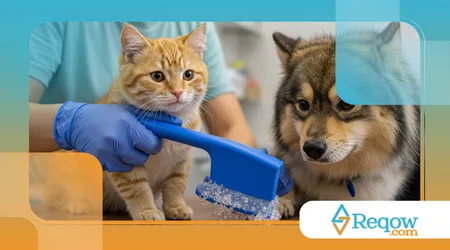What to never use when cleaning pets and accessories (and what many people still use)

Taking care of your pet's hygiene goes far beyond bathing or brushing them weekly. Many people believe they are doing the right thing when they use certain cleaning products, but the truth is that what to never use when cleaning pets It may be exactly what is most present in the home closet.
Advertisements
If you use strong disinfectants, products with strong odors, or clean your pet's accessories with any soap, you may be making a serious mistake — and unknowingly harming your best friend's health.
This guide was created for conscientious pet owners who want to avoid invisible but common risks in daily care.
Read on to understand what to avoid, why, and how to safely and effectively clean your pet.
Why are certain products dangerous for animals?
Before we talk about what to avoid, it’s important to understand why using common products can be a problem.
Advertisements
Animals’ bodies work differently than ours. What seems harmless to humans can be toxic to dogs, cats, rabbits, and other pets. Their digestive systems, skin, sense of smell, and even nervous systems are more sensitive — and that changes everything.
Pets also have a habit of licking themselves after bathing or lying on freshly washed blankets. This means that any chemical residue is even closer to their bodies and mouths. And that’s where the silent danger lies.
Many owners only realize the problem when symptoms appear: vomiting, itching, skin irritation or even poisoning.
In some cases, the damage builds up slowly and goes unnoticed for months. And all of this could be avoided with simple choices.
Read more: Bathing and Grooming: Ideal Frequency for Each Type of Pet
Chemical exposure and its effects on everyday life
Imagine a cat walking on a floor that has been cleaned with bleach. It steps on the surface, licks itself afterwards, and ingests invisible chlorine residue.
Now think of a dog whose bed is washed with scented fabric softener. He lies down, breathes in that intense smell, and develops respiratory allergies within a few weeks.
Veterinary studies show that continued exposure to household products can trigger skin diseases, hormonal disorders and kidney problems.
THE University of Illinois, for example, published research showing that cats exposed to phenolic compounds present in many disinfectants presented changes in the liver.
It is no exaggeration to say that the choice of cleaning product can make a direct difference in your pet's health. And knowing what to never use when cleaning pets is the first step towards creating a safer environment.
Products to avoid (and why)
Now that we understand the risks, the most important part is figuring out which products should be eliminated from your routine immediately. And be prepared, because many of them seem harmless at first glance.
Products with chlorine, ammonia or bleach
These are the most commonly used ingredients. Chlorine and ammonia are common ingredients in disinfectants, but they are extremely toxic to pets. Even when diluted, they can cause eye irritation, breathing difficulties and burns to mucous membranes.
Avoid using these products to wash the floor where your pet walks, clean the bathroom he uses or sanitize accessories such as pots, beds and litter boxes.
Disinfectants with phenol
Phenol is a substance found in products with pine or artificial lavender scents. It is highly toxic to cats and can be fatal if ingested in large quantities. Many owners unknowingly use these disinfectants to leave their homes “smelling nice” after cleaning, without realizing the risks.
Washing powder and fabric softeners
They are hidden villains. Laundry detergent can leave residue on fabrics even after rinsing. And fabric softener, in addition to its strong scent, contains chemical compounds that irritate your pet's skin and eyes.
When you wash blankets, beds or clothes with these products, the risk is immediate — especially for puppies and animals with sensitive skin.
Multipurpose products with strong smell
Intense perfumes are not synonymous with cleanliness for animals.
On the contrary: their sense of smell is much more acute, and strong smells can cause stress, vomiting, headaches and aversion to the environment. If your pet avoids entering a recently cleaned room, the smell may be the reason.
Isopropyl alcohol cleaners
Common in screen, glass, and countertop cleaners, isopropyl alcohol evaporates quickly but leaves irritating particles in the air and on surfaces. Pets that lick these areas can suffer mild to moderate poisoning.
How to do cleaning the right way
Avoiding toxic products is just the beginning. True safety lies in knowing how to replace, sanitize, and keep the environment clean in a way that is safe for your pet and for you.
Prefer veterinary or neutral products
To wash your pet's accessories, use neutral, fragrance-free soaps or products specifically designed for animal use. They are formulated to avoid allergies or poisoning.
Today, there are even disinfectants with the “pet safe” seal, approved by veterinarians.
Read labels carefully
If the product does not provide clear information about its composition, avoid it. Words such as “phenol”, “quaternary ammonium”, “nonylphenol”, “parabens” or “formaldehyde” are warning signs.
Even in small quantities, these compounds accumulate in the pet's body.
Ventilate the rooms well after cleaning
Open doors and windows whenever you do a heavy cleaning. Let the room air out before allowing your pet back in. This reduces the risk of inhaling toxic particles suspended in the air.
The impact of cleaning on the animal's emotional health
In addition to physical health, it is worth remembering that excessive smells or harsh products affect your pet's emotional well-being. Animals are sensitive to their environment. A place with a strong odor can make them restless, anxious and even depressed.
Cats, for example, are extremely sensitive to changes in smell. If their litter box is washed with bleach, many will simply refuse to use it — which can lead to urinary retention and other problems.
Data confirming the invisible risk
According to the ASPCA Animal Poison Control Center, more than 25% of pet poisoning cases are linked to household cleaning products. In many of these cases, the guardians thought they were taking good care of the environment.
This number shows how danger can be hidden in common habits. The good news is that it can also be prevented with simple, informed changes.
Conclusion: less chemistry, more care
To understand what to never use when cleaning pets is an essential step to ensure the health and well-being of our companions. Care is not about overdoing it, but about making the right choice. Gentle, natural products that are suitable for use with animals make all the difference — including to your pet's mood and safety.
Taking care of your pet's hygiene without putting their life at risk is more than just a responsibility. It's a gesture of love.
Common questions about safe cleaning for pets
Which homemade cleaning products are really safe?
Vinegar diluted in water, baking soda and neutral coconut soap are good alternatives. Always in small quantities and rinsed well.
Can I use regular alcohol to clean my pet's environment?
No. Even ethyl alcohol can cause poisoning if the animal comes into direct contact with it. Opt for solutions specifically designed for pets.
How to safely sanitize pet food bowls?
Use warm water and mild soap. Avoid using sponges with kitchen products, which can leave residue. Dry thoroughly before reusing.
Can I use the same laundry detergent to wash my pet's bed?
Not ideal. Soaps with perfumes and bleaching agents can cause allergies. Choose neutral options that are specifically designed for fabrics used by animals.
What signs indicate that your pet has been affected by a cleaning product?
Vomiting, excessive salivation, watery eyes, red skin, itching or sudden change in behavior. At the slightest sign, seek veterinary attention.
